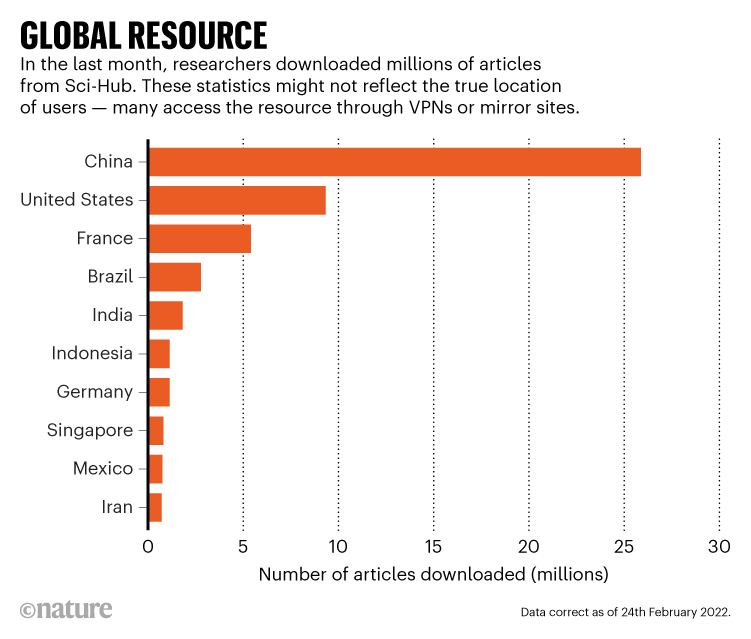

Sci-Hub downloads show countries where pirate paper site is most used
source link: https://www.nature.com/articles/d41586-022-00556-y
Go to the source link to view the article. You can view the picture content, updated content and better typesetting reading experience. If the link is broken, please click the button below to view the snapshot at that time.

Sci-Hub downloads show countries where pirate paper site is most used

Researchers worldwide have used Sci-Hub to access millions of papers. Credit: Alamy
Download figures for Sci-Hub, the popular but controversial website that hosts pirated copies of scientific papers, reveal where people are using the site most. The statistics show that users accessing Sci-Hub from China are by far the most active — and that with more than 25 million downloads, usage in China outstrips the rest of the top ten countries combined (see ‘Global resource’).
Perhaps surprisingly, the figures also show that the United States, in second place, has about one-third as many downloads, at 9.3 million. “There is a widespread opinion that Sci-Hub is of no use in the United States, because universities have money to pay for subscriptions, but that is not true,” says Alexandra Elbakyan, the site’s founder.
The statistics are updated daily and show the number of downloads from each country over the past month — but they are not normalized for the size of the research population.

Source: Sci-Hub
The data also suggest that researchers in countries whose universities lack the resources to pay for bulk subscriptions are making heavy use of the service. Many nations with fewer scientific resources appear in in the top 20, including Brazil (2.8 million downloads), Mexico (750,000) and Colombia (375,000). That does not surprise Juan Carlos Correa, a data scientist at the Prague University of Economics and Business. “Latin America is not a region where scientists enjoy competitive remuneration compared with other regions,” he says. “Most institutions in Latin America lack resources to pay subscription-based services such as those provided by large editorial companies.”
Limiting factors
The data come with several important caveats. The figures include only downloads from original Sci-Hub websites, not any replica or ‘mirror’ site, which can have high traffic in places where the original domain is banned. And virtual private networks (VPNs), which are often used to circumvent bans in countries such as the United Kingdom, can skew the results by making it appear that users are in a different country. This is probably why the Seychelles occasionally appears among Sci-Hub’s top 20 countries — the tiny island nation hosts several popular VPN services. And an ongoing legal battle in India could be affecting use among the country’s researchers. With 1.8 million downloads, India is in fifth place on the list, despite having the second-highest number of individual users, according to Elbakyan.
Juan Pablo Alperin, co-director of the Scholarly Communications Lab at Simon Fraser University in Vancouver, Canada, cautions against reading too much into a single month’s data. “At the very least, I would look at a year of data, where there is some correction for the different academic calendars. For example, much of South America takes holidays in January and February, so those numbers are probably somewhat depressed,” he says. Normalizing for population, research funding or number of published outputs would also provide more useful comparisons, he adds.
Despite these limitations, Correa says it is clear from the data that Sci-Hub is fulfilling a need in many parts of the world. “Sci-Hub has highlighted how a very passionate community towards scientific endeavours exploits alternative mechanisms to access scientific literature,” he says.
Recommend
About Joyk
Aggregate valuable and interesting links.
Joyk means Joy of geeK